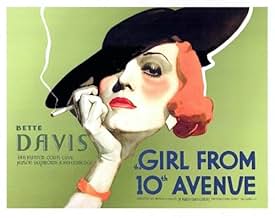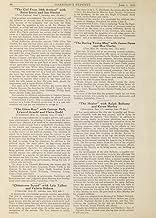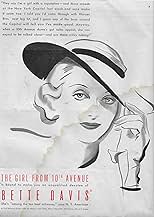IMDb RATING
6.7/10
1.5K
YOUR RATING
A lawyer impulsively marries a stranger after his fiancée dumps him.A lawyer impulsively marries a stranger after his fiancée dumps him.A lawyer impulsively marries a stranger after his fiancée dumps him.
- Awards
- 1 win total
Bill Elliott
- James
- (as Gordon Elliott)
André Cheron
- Max
- (as Andre Cheron)
Vesey O'Davoren
- Servant
- (scenes deleted)
Sam Ash
- College Club Guest Outside Bar
- (uncredited)
Brooks Benedict
- Waldorf Diner
- (uncredited)
Davison Clark
- Detective #2
- (uncredited)
Heinie Conklin
- Waiter at Marchand's
- (uncredited)
James Donlan
- First Detective
- (uncredited)
Featured reviews
Bette Davis is a poor working girl who is about to lose her job and is on her lunch hour. While watching outside a church where a high society wedding is taking place, she stands next to a drunk man who is muttering as the preacher administers the vows. Davis realizes that he is creating a disturbance and gets him to leave with her and the go to a nearby place where she can get a sandwich and he can drink.
Thus starts the relationship that eventually leads to them ending up married. He was driven to drink by the girl at the church who was getting married, because even though she loved him, she was marrying a richer man.
Davis sobers him up and gets him back to his position as a society lawyer in a top firm. All the while telling him that if he wants out, he just has to say so.
Many trials and tribulations ensue before he realizes he does indeed love his wife who he married on a drunken impulse.
The 1935 "ladies who did lunch" got their monies worth from Davis, Ian Hunter, Alison Skipworth, Phillip Reed and John Eldredge, and a top production.
Go back in time to the depression years, the downtown movie palaces with double features, and ladies in their suits, gloves and hats, who went to town once a week for the family shopping and then went to see their favorite stars. This film is one they would have seen - and loved. 9/10
Thus starts the relationship that eventually leads to them ending up married. He was driven to drink by the girl at the church who was getting married, because even though she loved him, she was marrying a richer man.
Davis sobers him up and gets him back to his position as a society lawyer in a top firm. All the while telling him that if he wants out, he just has to say so.
Many trials and tribulations ensue before he realizes he does indeed love his wife who he married on a drunken impulse.
The 1935 "ladies who did lunch" got their monies worth from Davis, Ian Hunter, Alison Skipworth, Phillip Reed and John Eldredge, and a top production.
Go back in time to the depression years, the downtown movie palaces with double features, and ladies in their suits, gloves and hats, who went to town once a week for the family shopping and then went to see their favorite stars. This film is one they would have seen - and loved. 9/10
If you want to see Bette Davis in one of her earlier pictures this is a must-see film.
As far as the film itself, it is one of the most boring and average scripts and it is very formulaic code material.
There is nothing new and interesting about the story. Standard soap opera.
It is predictable, boring and pretty much a waste of time.
But for a true Better Davis fan, this deserves watching. Otherwise this is about as bad as it gets.
Knew from reading 'The Girl from Tenth Avenue's' plot synopsis to not expect too much from the story, which in feel is not much different from a lot of other films at that time. Where more often than not one had to suspend disbelief and not watch looking for sense. Bette Davis has done many fine performances and seldom less than watchable (depending on the material of course, with her being unable to do anything good with the bad material in 'Wicked Stepmother' and 'Bunny O Hare'.
Also like what (not enough) has been seen of Alfred E Green's work, prime examples being 'Baby Face' and 'Dangerous', the latter also starring Davis and earned her her first Oscar win (while extremely good in that film quite a number of her other performances were more deserving). Colin Clive's life and career were too short, but he was watchable too and still love the two 'Frankenstein' films he starred in. Seeing 'The Girl from Tenth Avenue' a while back, to me it was good fun and an inoffensive way to spend just a little over an hour but didn't fit my definition of being a great film.
'The Girl from Tenth Avenue' is not one of those films that compels from the get go. It instead takes time to settle and find its footing, starting off a little too slow and having too much of a confined and stage origins feel. Most of the characters are sketchily developed and gives some of the cast too little to do. The cast mostly do a good job though and make the most of what they have to work with, but this was very much a Davis vehicle and it does show a bit in how the characters are written and how much screen time they have. Ian Hunter however doesn't have an awful lot of presence apart from towards the end during his big scene with Davis.
Have said already about not trying to expect too much from the story, and still stand by that with some of it being predictable and quite silly. Especially in the first half. If that is something that has been a common criticism in my recent reviews it is because it was a common factor for films during this period, so reinforcing is inevitable.
Like has been said though, 'The Girl from Tenth Avenue' is not a film to switch off and dismiss prematurely. It really does get better, more gripping and one is rewarded enough when sticking with it. Davis gives a great full throttle performance and of the rest of the performances Alison Skipworth shines the most and on sparkling form. Katherine Alexander also has one of the film's best scenes and Clive brings dignity to an underused role. Green's direction is mostly smart and keeps the high emotions of the drama in the latter stages gripping.
Much of the script is snappy and thoughtfully written, not rambling too much and it doesn't get verbose. It does get over-heated at times but not in a way that's unbearable. The second half of 'The Girl from Tenth Avenue' has plenty of moments of tension and poignancy, especially towards the end with two scenes (aforementioned) that particularly blister, much of it down to Davis being so good. It is well shot and doesn't look cheap.
In summary, not a great film but passes the time more than adequately. 7/10
Also like what (not enough) has been seen of Alfred E Green's work, prime examples being 'Baby Face' and 'Dangerous', the latter also starring Davis and earned her her first Oscar win (while extremely good in that film quite a number of her other performances were more deserving). Colin Clive's life and career were too short, but he was watchable too and still love the two 'Frankenstein' films he starred in. Seeing 'The Girl from Tenth Avenue' a while back, to me it was good fun and an inoffensive way to spend just a little over an hour but didn't fit my definition of being a great film.
'The Girl from Tenth Avenue' is not one of those films that compels from the get go. It instead takes time to settle and find its footing, starting off a little too slow and having too much of a confined and stage origins feel. Most of the characters are sketchily developed and gives some of the cast too little to do. The cast mostly do a good job though and make the most of what they have to work with, but this was very much a Davis vehicle and it does show a bit in how the characters are written and how much screen time they have. Ian Hunter however doesn't have an awful lot of presence apart from towards the end during his big scene with Davis.
Have said already about not trying to expect too much from the story, and still stand by that with some of it being predictable and quite silly. Especially in the first half. If that is something that has been a common criticism in my recent reviews it is because it was a common factor for films during this period, so reinforcing is inevitable.
Like has been said though, 'The Girl from Tenth Avenue' is not a film to switch off and dismiss prematurely. It really does get better, more gripping and one is rewarded enough when sticking with it. Davis gives a great full throttle performance and of the rest of the performances Alison Skipworth shines the most and on sparkling form. Katherine Alexander also has one of the film's best scenes and Clive brings dignity to an underused role. Green's direction is mostly smart and keeps the high emotions of the drama in the latter stages gripping.
Much of the script is snappy and thoughtfully written, not rambling too much and it doesn't get verbose. It does get over-heated at times but not in a way that's unbearable. The second half of 'The Girl from Tenth Avenue' has plenty of moments of tension and poignancy, especially towards the end with two scenes (aforementioned) that particularly blister, much of it down to Davis being so good. It is well shot and doesn't look cheap.
In summary, not a great film but passes the time more than adequately. 7/10
The Girl From 10th Avenue is one of those B programmers that the brothers Warner were throwing Bette Davis into before they realized what a talent they had. She had already done and got rave reviews for Of Human Bondage, but it made not a whiff of difference. She was a few films from her consolation Oscar for Dangerous.
When Davis got films really beneath her she just went full blown Bette with the voice and the mannerisms that impressionists made a living on for decades. In this film she's a shopgirl who lives in Hell's Kitchen on 10th Avenue who happens to aid a 5th Avenue playboy Ian Hunter when he's been out on a toot. The two wind up married. But can they make a go of it and can Bette fit in with the society just five city blocks from her roots.
This was another Depression Era plot, the shopgirl who marries well and tries to make a go of it. Joan Crawford over at MGM was well known for these roles, though the best of them was the gold digging Crystal in The Women. Davis has to deal with Katharine Alexander who Hunter had broken off with and Hunter has Alexander's ex-husband Colin Clive as a confidante.
Who really scores well is Alison Skipworth who back in the day was a Floradora girl who made a society catch of her own. Skipworth shows Davis the ropes in her own inimitable style.
The Girl From 10th Avenue gets a couple of notches higher rating simply because Davis pushes it up.
When Davis got films really beneath her she just went full blown Bette with the voice and the mannerisms that impressionists made a living on for decades. In this film she's a shopgirl who lives in Hell's Kitchen on 10th Avenue who happens to aid a 5th Avenue playboy Ian Hunter when he's been out on a toot. The two wind up married. But can they make a go of it and can Bette fit in with the society just five city blocks from her roots.
This was another Depression Era plot, the shopgirl who marries well and tries to make a go of it. Joan Crawford over at MGM was well known for these roles, though the best of them was the gold digging Crystal in The Women. Davis has to deal with Katharine Alexander who Hunter had broken off with and Hunter has Alexander's ex-husband Colin Clive as a confidante.
Who really scores well is Alison Skipworth who back in the day was a Floradora girl who made a society catch of her own. Skipworth shows Davis the ropes in her own inimitable style.
The Girl From 10th Avenue gets a couple of notches higher rating simply because Davis pushes it up.
After his girlfriend Valentine French dumps him to marry a wealthy suitor, prominent lawyer Geoffrey Sherwood (Ian Hunter) gets drunk and impulsively marries Miriam Brady (Bette Davis) whom he had just met.
This has a dash of Pygmalion with a love quadrangle. The Pygmalion part could be more acute and it would help to have Geoffrey do the teaching. The issue is that Geoffrey and Miriam need to build more chemistry in their relationship. He's a drunk and she has no reason to want him other than finances. Quite frankly, I'm fine with dumping Geoffrey with Valentine if they still want each other. I don't see the romantic connection between Geoffrey and Miriam. Any chemistry is generated by the power of Bette Davis' charisma and I question her reasoning. Otherwise, this is an emotionally flawed romance.
This has a dash of Pygmalion with a love quadrangle. The Pygmalion part could be more acute and it would help to have Geoffrey do the teaching. The issue is that Geoffrey and Miriam need to build more chemistry in their relationship. He's a drunk and she has no reason to want him other than finances. Quite frankly, I'm fine with dumping Geoffrey with Valentine if they still want each other. I don't see the romantic connection between Geoffrey and Miriam. Any chemistry is generated by the power of Bette Davis' charisma and I question her reasoning. Otherwise, this is an emotionally flawed romance.
Did you know
- TriviaThe original play opened in New York on 2 November 1914.
- GoofsWhile drinking with John at the College Club, Geoffrey fills his glass in three successive shots without drinking the previous contents.
- Quotes
Geoffrey Sherwood: Now I'm in oil.
Hugh Brown: So is a sardine.
- ConnectionsReferenced in Fat Chance (1981)
- SoundtracksBridal Chorus
(uncredited)
from "Lohengrin"
Music by Richard Wagner (1850)
Played on an organ before the wedding
Details
- Release date
- Country of origin
- Languages
- Also known as
- Men on Her Mind
- Filming locations
- Production company
- See more company credits at IMDbPro
- Runtime
- 1h 9m(69 min)
- Color
- Sound mix
- Aspect ratio
- 1.37 : 1
Contribute to this page
Suggest an edit or add missing content





































